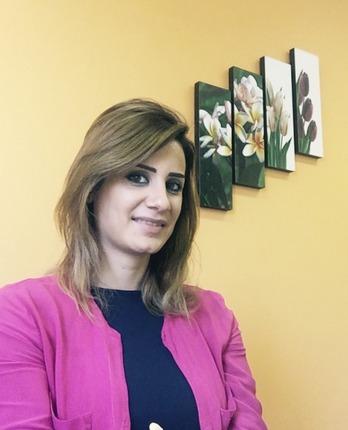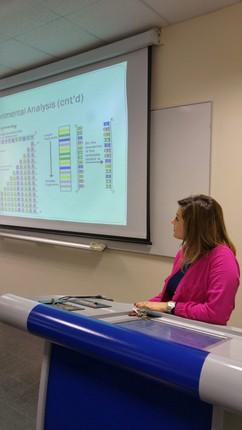Alumni Spotlight: Soha Yazbek
Dr. Soha Yazbek is an Assistant Professor of Genetics at the Medical Laboratory Sciences Program, FHS. Dr. Yazbek’s training was in basic genetics and has focused on researching the genetic basis of complex multifactorial diseases mostly on the genetic basis of Diabetes and Non-communicable diseases. Yazbek has also been involved with a multidisciplinary team at the Faculty of Health Sciences to identify the research gap in Non-communicable diseases in selected regions of the Middle East. Recently, her research has focused on the genetic disease status and the genetic service response in Lebanon. Her recently published review identified a dramatic deficiency in genetic services in light of the detected genetic diseases and patient needs. Dr. Yazbek has since also focused on doing the basic and necessary research to pave the way to establish a very well needed genetic health care system in Lebanon and to direct research agendas on genetics of NCD towards burden alleviation. Dr. Yazbek also works on functional genomics of a novel gene affecting obesity and diabetes. Soha holds a PhD in Genetics from Case Western Reserve University, and M.S. in Molecular Biology from the Lebanese American University and a B.S. in Medical Laboratory Sciences at AUB.
Full Name: Soha N. Yazbek
Graduation Year and Major: M.S. in Molecular Biology/ 2005
Post Graduate work / Degrees: 2010 -PhD in Genetics from Case Western Reserve University

Current Profession: Assistant Professor at American University of Beirut
Currently Living in: Amshit, Lebanon
Tell us what you remember about your course of study at LAU:
My coursework covered all of the relevant biological knowledge that a well-rounded researcher in the molecular and genetics field would need to know, including the latest research in genomics and bioinformatics. The electives were very diverse and interesting. I was given the opportunity to participate in teaching and lab course preparation. The program offered a wide range of research projects, and my thesis work helped me prepare for a career in science and proved to be a much needed first step towards understanding research work. By the time I graduated and defended my thesis, I was able to perform most of the advanced molecular techniques that were a great addition to my preexisting lab skills and I had the ability to read, interpret and contribute to scientific literature. My masters project was shortly published which gave me an unequal push towards my higher education.
What did you enjoy about your time at LAU (your most significant memories) and did it help you to decide on your next steps towards becoming who you are now?
My experience at the natural science department was unforgettable and profoundly shaped the researcher and mentor I am today. I was particularly touched by how close the professors were to their students, the detailed follow up to ensure the success of the research projects. The labs eventually felt like home and the professors and staff members were very supportive and genuinely had my best interest in mind. The professors allowed us enough independence in the research topic and allowed us to learn from our mistakes but at the same time were available for continuous guidance, a balance very difficult to achieve in mentoring basic science.
What’s the secret of your success?
I consider myself working hard on the path to be successful, at least in the knowledge I produce and transfer to the students. I try to abide by the following:
- Persistence and Perseverance: Life and work in academia and research can encounter a lot of failure and fall downs, so you learn how to pick things back up and look down another path.
- Discipline: Research and academics is a flexible career so I was sure to dedicate enough time to ensure continuous productivity.
- Hard work: Nothing comes easy and intelligence does not play a huge role in science, I put in a lot of hours, read a lot and learned to multi task.

Do you have any advice for students in your field of study/expertise?
Benefit as much as you can from the experience of your mentors in research. Read a lot, learn how to write in science and familiarize yourself with as many techniques and methodologies as possible to capture the most out of your graduate studies at such a welcoming environment as LAU.
Most importantly be passionate about you do no matter what.